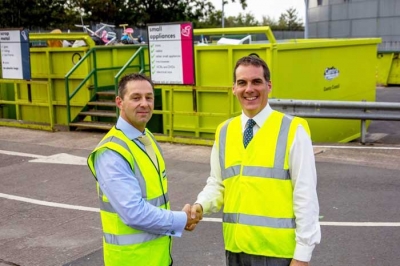Business in brief 05/09/2014
Viridor landfill fire extinguished
Waste management company Viridor has confirmed that the fire at the Trigon Landfill has now been extinguished and Dorset Fire and Rescue Service is in the process of leaving the site.

Viridor is now managing the cooling phase, which includes digging through the burnt waste to remove any hotspots and continuing to saturate the site with water.
During this period, the site will be on 24-hour watch and managed by James Rosewell, Trigon Site Manager supported by Viridor’s Technical & Environmental Manager, Tim Bigelow, who has fire fighting experience.
Dan Cooke, Director of External Affairs for Viridor, said: “We would like to thank the Dorset Fire and Rescue team who did a fantastic job getting this fire extinguished with a clear strategy and a professional and efficient team”.
The Environment Agency and Viridor are continuing to investigate how the fire started to ensure that the site is ‘safe and compliant to reopen’.
Find out more about the Trigon landfill fire.
WELTEC BIOPOWER to expand Dorset AD plant
Biogas plant developers WELTEC BIOPOWER (UK) Ltd, has been granted the contract to add 1.1 megawatts of capacity to Eco Sustainable Solutions’ anaerobic digestion facility in Piddlehinton, Dorset.
The original Eco-Dorset AD plant was built by WELTEC and commissioned in 2012. However, due to the increases in food waste being collected by local authorities, the operators are looking to increase the capacity of the facility to 37,000 tonnes of food waste per annum. This will be digested to produce enough biogas to generate 1.6 megawatts a year.
The electricity generated at the plant as well as excess gas is fed to an adjacent feed mill, however when the mill is not operational, the power is fed to the National Grid.
The digestate produced by the plant, which is in the process of gaining PAS 110 accreditation, is collected and used by local farmers.
WELTEC Sales Manager Kevin Monson said: “We recognize that an AD plant is a 20 year partnership and that maintaining solid trust-based working relationships with our clients is crucial to our ongoing success. Therefore we now have a dedicated UK-based Service and Maintenance capability with locally available spare parts”, sales manager Kevin Monson explains.
Cumria Waste Management wins 10-year HWRC contract
Cumbria Waste Management Limited (part of the Cumbria Waste Group) and the Cumbrian branch of Shanks Waste Management Limited (Shanks) have signed a 10-year contract to manage Cumbria County Council's 14 household waste recycling centres (HWRCs).
 Cumbria Waste Management Limited began managing the sites on behalf of Shanks five years ago, and, following a good working relationship, has now entered into a new contract for the next decade.
Cumbria Waste Management Limited began managing the sites on behalf of Shanks five years ago, and, following a good working relationship, has now entered into a new contract for the next decade.
Commenting, Nick Blake, Contract Director of Shanks Cumbria (pictured, above left), said: "I'm delighted that Cumbria Waste Group will continue to operate the sites. Our two companies have formed a strong partnership over the past five years which [sic] has led to a significant increase in the percentage of waste recycled.
"When we started in 2009 these sites recycled or reused an average of 60 per cent and now they are averaging 70.6 per cent."
Mike Bareham (pictured, above right), Managing Director of Cumbria Waste Group (CWG), said that the contract was a “big step forward for a local business”, adding that it would give CWG “a firm foundation upon which to plan for the future”.
The 14 HWRCs are at Ambleside, Barrow, Carlisle, Brampton, Workington, Frizington, Grange-over-Sands, near Penrith, Kendal, Kirkby Stephen, Maryport, Millom, Wigton, Ulverston.
Find out more about Cumbria Waste Group and Shanks Cumbria.
UKCM to combat rough sleepers by installing new locks
Container repair and refurbishment company UK Container Maintenance (UKCM) has announced it will install ‘new forest locks’ to containers in a bid to combat people taking shelter in bins.
The lock system sees one side of the bin installed with a metal post with a hole at the top, which a padlock can slip into, thus locking the lid of the bin (see picture below).
UKCM is encouraging waste companies and local authorities to take better precautions and keep containers locked when they’re located in problematic areas in order to prevent rough sleepers taking shelter in them.
 UKCM’s co-founder Emma Elston, explains: “Increasingly, containers within city centres and large towns are becoming a common place for homeless people to take cover in, this is not only saddening but also dangerous, especially when waste vehicle operators are not taking the time out to check each container before emptying the contents which in some cases can lead to injury and sometimes death.
UKCM’s co-founder Emma Elston, explains: “Increasingly, containers within city centres and large towns are becoming a common place for homeless people to take cover in, this is not only saddening but also dangerous, especially when waste vehicle operators are not taking the time out to check each container before emptying the contents which in some cases can lead to injury and sometimes death.
“New forest locks are cost effective and straightforward to fit, and by using these particular locks it also mean operators will have to get out of the vehicle to take off the lock and visually check that there is no one inside the container.
Earlier this year, the Chartered Institution of Wastes Management (CIWM), in partnership with Biffa and StreetLink, found that in 40 per cent of occasions in which rough sleepers were found sheltering in a bin, the person was not discovered until the loading operation had begun, while 16 per cent of the time, the person was only found once actually tipped out of the bin. In one case, there was a fatality following the person being tipped out of the bin and crushed.
To help reduce the incidences of people sleeping in bins (and thus reduce the risk of injury), the report suggest that organisations involved in waste management operations undertake a range of precautions including checking for people inside containers before emptying and providing bins that lock.
Find out more about UKCM or the perils of rough sleeping in bins.
Veolia wins Norwegian Oil Platform Decommissioning Project
Veolia group, through its subsidiary Veolia Environmental Services UK, has won a contract to decommission a 14,000-tonne oil platform in the Norwegian North Sea.
The YME oil platform, owned by Talisman Energy, is 72 metres long and 87 metres high and will be removed and towed in a single lift from its current North Sea location and subsequently dismantled by Veolia at its decommissioning site at Lutelandet, Norway (pictured below) in ‘mid-2015’.
The 14,000 tonne offshore structure and equipment will be dismantled and recycled at Lutelandet, once the platform arrives in mid-2015. Veolia intends to recycle 99.7 per cent of the structure, which contains a range of valuable materials including precious metals, iron, steel and electrical items.

The YME platform will be the first in an anticipated pipeline of work that Veolia will undertake at the site.
Estelle Brachlianoff, Veolia Senior Executive Vice President UK and Ireland said: “This new decommissioning operation confirms Veolia’s strategic position and its expertise in this ever expanding £1 billion a year market with 2,000 platforms needing to be decommissioned over the next 10 years. This significant contract with YME will be our foothold in the oil and gas sector which is integral to our future growth.”
Find out more about Veolia’s decommissioning work.





